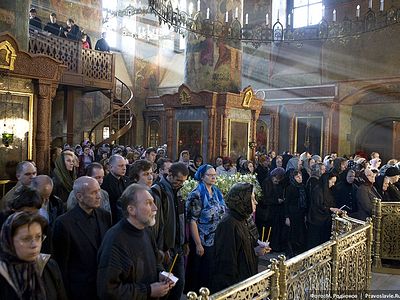A number of years ago during the years of communism, a certain old Romanian priest would never greet anyone with the typical “Hello” or “Good Morning”. Instead, he greeted anyone he met with a radiant smile and the words “Rejoice always!” Now this may seem like an unusual way to greet someone, but it is even more incomprehensible when one learned that this priest was in terrible prison, while his son and daughter, along with two sons-in-law also suffered in prison. Even though his entire family endured horrible persecution, the priest still greeted everyone by saying, “Rejoice always!”
In today’s Palm Sunday epistle reading, we hear St. Paul offer similar words - “Rejoice in the Lord always” - to the persecuted believers in Philippi, while he himself languished in a prison cell.
How can anyone in prison, someone suffering, anyone facing difficult circumstances, exhort others to “rejoice?” What is this holy joy that such people as St. Paul, and that Romanian priest radiated.
“Rejoice always! Rejoice in the Lord always.” Such phrases obviously imply JOY, yet in our world today too many people don’t understand what brings joy. Many think joy comes with constant pleasure, and thus busy themselves with trivial and meaningless pursuits to occupy and fill their time. Others think that material success and excess will make their lives joyful, while still others say that popularity and fame are the only way for true happiness.
Think for a moment about those who you know who may reflect a deep inner, authentic joy, and tell me who they are. Over the years of my life I have been blessed to meet a few such people – people who exemplified and exuded holy joy. I knew three dear simple old women who endured the horrors and fears of communism in Albania, yet carried an inner joy during all their years of uncertainty and suffering. Archbishop Anastasios of Albania is another model for me. I stayed close to him during numerous difficult times in Africa and in Albania, yet I witnessed how he exuded an inner joy during the most challenging times. Then there was Bishop Gerasimos of blessed memory during my seminary years, a simple, gentle, humble soul who exuded joy. I developed a nice relationship with some nuns of Mother Teresa and they were another great example of people with joy. Most of these people were individuals with very little material wealth, yet all possessed a great faith that acted as the source of their true joy!
Ultimately for us Christians, there is only one source of everlasting impenetrable joy – and that source is God Almighty. To know Jesus Christ in the depths of our souls, to allow Him to enter into our hearts and guide our lives, and to be filled with his Holy Spirit is the ultimate definition and experience of joy, because He is precisely the source.
When someone abides in God, he/she is connected to all that God has created, and thus, the entire world becomes a beautiful place. Even in the midst of chaos and darkness, sadness and evil, when logic tempts us to despair, our relationship with Christ gives us a different and refreshing perspective, filling us with hope and love. This is why the saints radiated joy in spite of their hardships and martyrdoms. This is St. Paul and that Romanian priest under communism could rejoice under any and every circumstance.
These saints discovered the secret of the Christian life – that God is always with us, and that faith in Him chases away all fear, despair and hopelessness. When we abide in His love, we discover the security and comfort to rejoice even in the midst of tragedy or uncertainty.
I don’t say we rejoice because of tragedy, but instead, we can rejoice in the midst of tragedy. In any and every situation, we will be able to see something positive and good. If God is with us, there is always hope and a glimmer of light.
This upcoming Holy Week, which begins tonight and will take us through the darkest days of humanity, reminds us of this unquenchable joy in the midst of tragedy. On Holy Thursday we travel through the passion of Christ, when everything seems dark and hopeless. Jesus is betrayed by one of his dear friends, his followers abandon him, and his closest companion denies knowing him. Christ is put on trial, condemned, ridiculed, beaten, and crucified by his own people. Yet the story does not end with suffering and death. Although evil seems to prevail, God has the final say!
Our sadness and despair turn to inexpressible joy as we hear on Pascha night, “Come receive the light from the unwaning light, and let us glorify him who is risen from the dead!”
From a human perspective, the situation seems hopeless. From God’s point of view, victory was certain. Here is the secret of how the saints could rejoice in even the worst of situations. If we know the Risen Lord, and have His Spirit abiding within us, than we automatically have His Joy shining from our lives!
So how can we make joy a central part of our lives? Let me offer three concrete suggestions:
First, we need to allow Christ to ENTER INTO AND rule our lives. Today on Palm Sunday, we celebrate the feast of Jesus entering into Jerusalem as a king. People lined up on the streets to greet and praise him. “Hosanna to God in the highest! Blessed is He who comes in the name of the Lord.” We are called to join with the crowd in praising Him, yet just like the crowd, we have a decision before us. Will our cry of “hosanna” be a sincere cry, where we ask Christ to come and dwell at the center of our lives, or will we cry out in a superficial manner like they did 2000 years ago, honoring him for a day, but rejecting, denying and even crucifying him later in our lives.
If Christ is truly our king, we need to find time not only during Lent but throughout the entire year to commune with Him through prayer and meditation, Bible study and frequent participation in the Holy Sacraments, no matter how busy our schedule is. Excuses of being too busy simply reflect our insincerity
A second way of being filled with joy is to NEVER ALLOW THE ANXIETIES AND TROUBLES OF LIFE TO DROWN OUT OUR FAITH AND TRUST IN GOD. In the same passage where St. Paul says to “Rejoice in the Lord always!” he also counsels “don’t about anything, but in everything, through prayer and supplication, with thanksgiving, let your request be made known to God. And the peace of God that passes all understanding will abide richly in your heart.” In other words, holy joy comes when we learn to place all our concerns and troubles in God’s hands, and then to believe that he is in control!
A third way to discover joy is to be thankful for everything in our lives. An incredible example of gratitude is the Romanian priest I mentioned at the beginning of the sermon. When a fellow prisoner asked this priest how he could rejoice when he and his family suffered so much, he replied, “Rejoicing is easy if we follow St. Paul’s lesson to “Rejoice with those who rejoice.” When we learn to rejoice with all those who rejoice, we have plenty of motivation for joy. For example, I sit in jail yet I rejoice with those who are free. I can’t go to Church and am not able to receive Holy Communion, but I rejoice with the millions of people around the world who go to Church and receive Communion every week. I can’t see my children and my grandchildren, but I rejoice with those surrounded by their loved ones . . . When we rejoice with those who rejoice, we can find many reasons to radiate joy.”
Let us celebrate Palm Sunday today by praying that Christ may enter more fully into the depths of our hearts and lives as our Lord and King! If Jesus abides there, guiding us every moment of every day, then we will truly discover the source of ineffable joy! We will be able to “rejoice always” and give thanks in every circumstance.
A most blessed Palm Sunday to all of you, one filled with the joy of our Lord, and I pray that this Holy Week will be an inspiring journey of deeper discovery, helping each one of us grow in that holy joy promised by our Lord.







